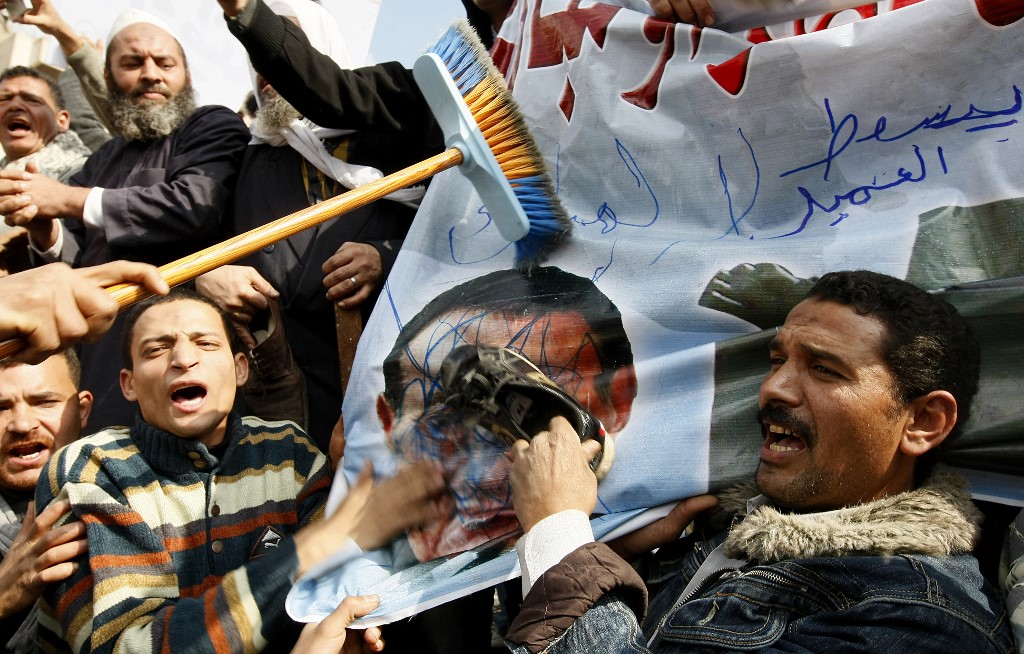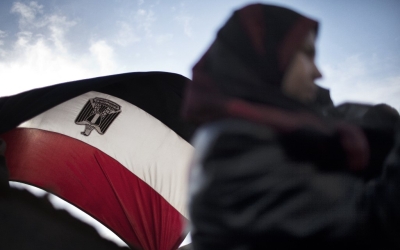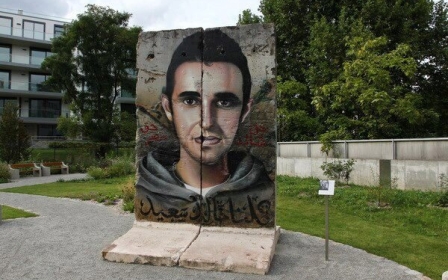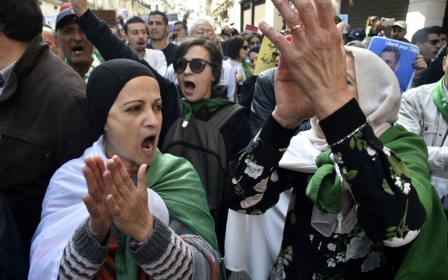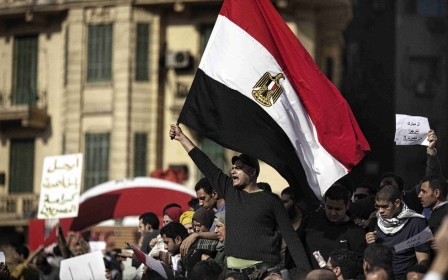Egypt's January revolution: Memories of motherhood, guilt and ecstasy
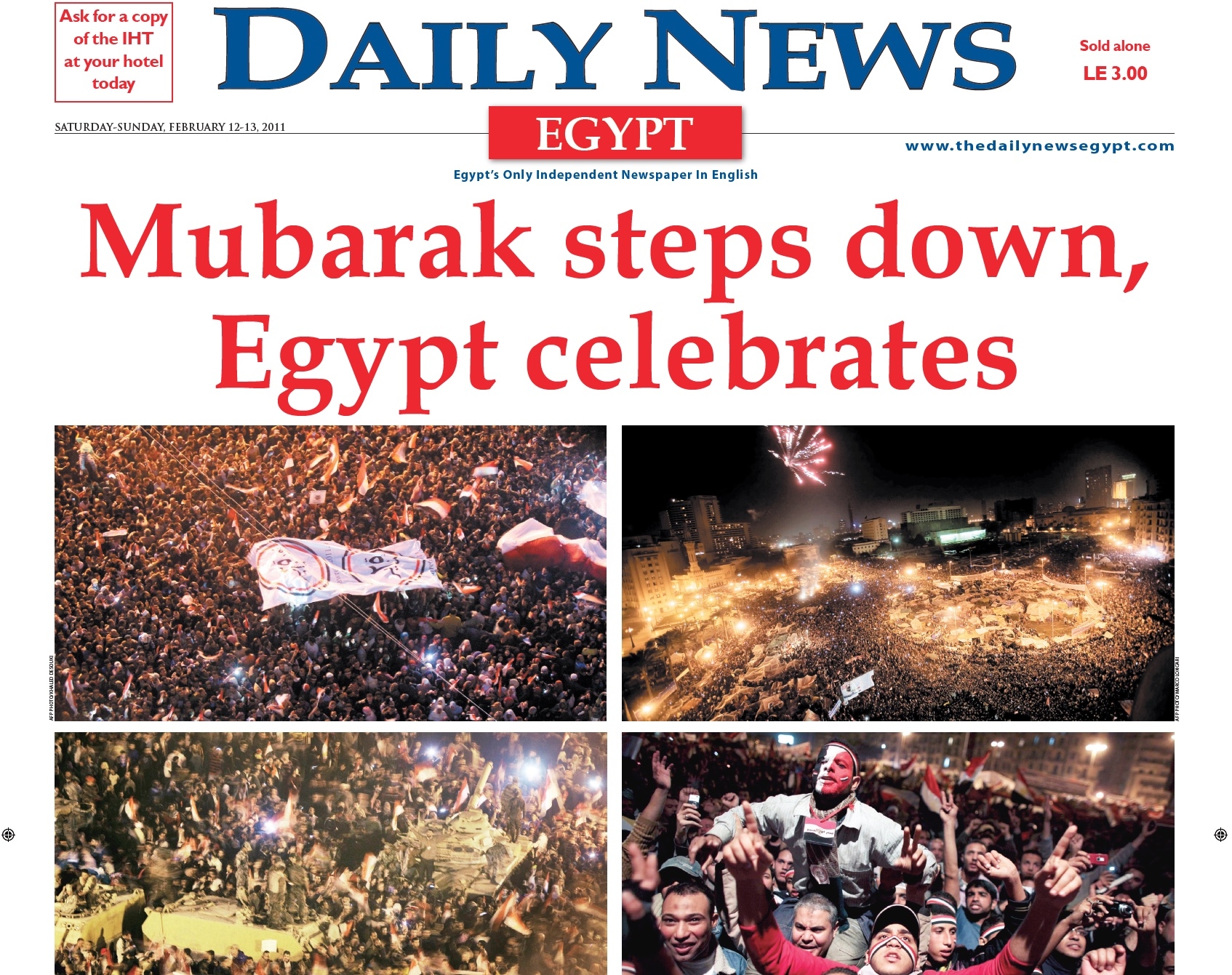
Ten years ago today was a moment that will be forever etched into my memory. The place: 37 Amman Street, Mohandiseen, Cairo. The time: 6.02pm.
The event: a 30-second televised statement by then-vice president Omar Suleiman, delivering a carefully crafted message that Egypt’s dictator of 30 years, Hosni Mubarak, had stepped down, and the Supreme Council of the Armed Forces had been“instructed” to take over the affairs of the state.
The only snapshot I have of him is from that night at the paper - an eternal reminder of his inexorable cry for attention
As chief editor of Daily News Egypt at the time, I had been at the paper every single day since the uprising broke out on 25 January 2011. But that particular Friday was different. Lying quietly in his portable car seat on the floor next to my desk was four-month-old Hassan, my only child, the child of the revolution.
I look back on this day and realise it was no coincidence that Hassan was there. Just as his birth was a precursor to the rebirth of the nation, his presence with me at that moment, crowning the most significant 18 days of Egypt’s modern history, is a testament to the fact that the public is personal.
That moment was not a mere entry in a chronology of significant events, but a turning point in my life - as it was for millions of others whose lives were inextricably bound to and altered by that 30-second speech.
New MEE newsletter: Jerusalem Dispatch
Sign up to get the latest insights and analysis on Israel-Palestine, alongside Turkey Unpacked and other MEE newsletters
Startled by the burst of jubilant cries in the newsroom, Hassan screamed at the top of his lungs as tears streamed down his tiny cheeks, demanding I play my role in his life; demanding his mother, with a determination he had rarely exhibited before, as if telling me: “Look here. Look at me. It’s my turn now.”
Sense of belonging
There was no question as to whether I would go back to work once my maternity leave was over. At that point, I had been the editor of this daily paper for five years, and the concept of relinquishing that duty was unthinkable. This was not a job. It was the embodiment of my sense of belonging to my country, my purpose in life.
It was more natural for me to find ways to delegate the responsibility of caring for my fragile, underweight newborn than to imagine ever leaving the paper. Under the circumstances, doing so would have been an act of high treason against my loftiest ideals, my higher calling.
At that moment, the two sides of my life collided with full force. There I was, watching history unfold, scrambling to send the most important edition of my career to press, attempting to find the words to capture the spectrum of conflicting emotions battling in my head; while at the same time being pulled away by the persistent exhortations of that helpless child, who had no one else to turn to for comfort but me.
Completely in character, I did what I always do: delegate. I got a colleague to “handle” Hassan for an hour or two until we wrapped, then abruptly switched hats, pretending to be the ultimate sacrificing mother I made myself believe I was. It’s how I dealt with the guilt - layers and layers of it, buried under a facade of bravado, independence and invincibility.
Poetic justice
There is a black hole in my memory about Hassan throughout the 18 days. The only snapshot I have of him is from that night at the paper - an eternal reminder of his inexorable cry for attention.
At the start of the uprising, I bundled him up and left him with my mother, while I fulfilled my sublime duty as “truth-teller”.
His reaction was swift and unyielding. Within a few weeks, he graciously and lovingly cut the bond tying us together. Weaning was fast and final, a process of unilateral disengagement he initiated on his own terms, leaving me feeling isolated and dismembered. It was as if a piece of me was cut off. But even though I could see it and touch it, I was unable to connect it back to me. Poetic justice; I had done it to him first.
As I reflect on the past 10 years, I try in vain to piece it all together, all of it: the lies and betrayals, grief and exhilaration, compassion and indifference, agony and the ecstasy. But all I can see in my mind’s eye is a series of fleeting vignettes, tenuously linked by the guilt-laden image of my neglected child, screaming with all his might for my attention.
Was it worth the price we paid? The pangs of guilt I suffer to this day? Was it worth the sacrifice?
Phoenix rising
Ten years, a decade, a nugget of history, a blur in my memory. The uprising is a disembodied historical artefact. Was I even there? It feels like it happened to someone else, somewhere else.
As I look around for traces of it in the foggy chambers of my mind, it eludes me. Yet, Hassan’s 10 years in this world are material evidence that it did happen. True, it failed, but there is no denying it happened, despite the dogged attempts to erase it from our collective memory.
The idea that its slow death is inversely proportional to Hassan’s life is somehow consoling, like a phoenix rising from the ashes.
And yes, it was worth the sacrifice.
The views expressed in this article belong to the author and do not necessarily reflect the editorial policy of Middle East Eye.
Middle East Eye delivers independent and unrivalled coverage and analysis of the Middle East, North Africa and beyond. To learn more about republishing this content and the associated fees, please fill out this form. More about MEE can be found here.



